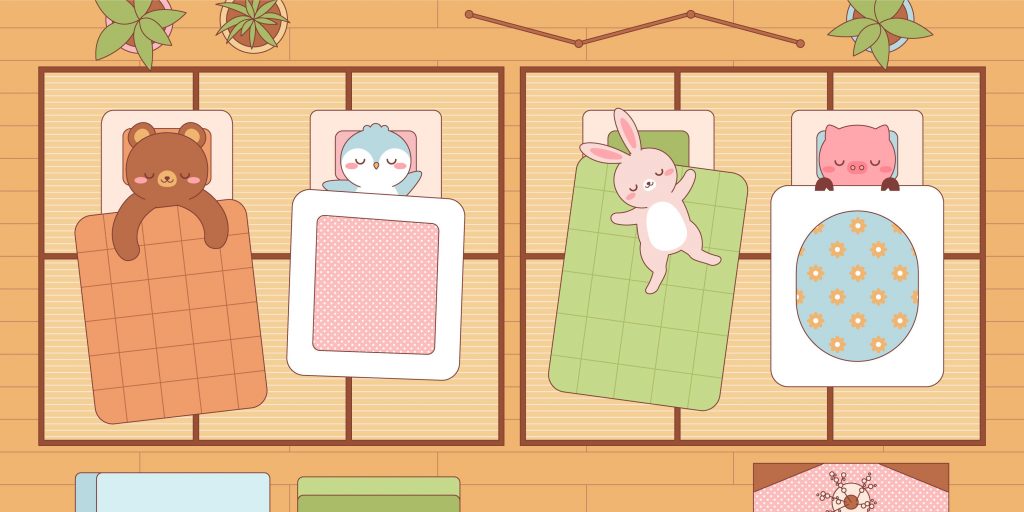The Japanese language offers speakers a diverse vocabulary to be used in casual and format situations respectively. This includes saying good morning or good night in Japanese to your friends, coworkers, or boss. This article will help you understand how to say good night and good morning in Japanese using a variety of phrases including the most commonly used, おやすみ (oyasumi), which simply translates to “goodnight” (casual) and おやすみなさい (oyasuminasai) which also means goodnight but this is a formal form..
Table of Contents
おやすみ (oyasumi) in a Break Down
Beginning with the common way to say good night in Japanese, おやすみ (oyasumi), it’s important to understand that it actually originates from the Japanese verb “ yasumu (休む)” which has multiple meanings. Some of the meanings include: to be absent, to take a day off, to rest, to have a break, to go to bed, or to rest” As you can see there are many scenarios in which the verb can be used, however, it’s important to remember the context of the situation first, whether casual or formal.
Additionally, two important conjugations can be added in order to make the phrase more polite when used in a sentence. These conjugations are なさい (Nasai) – Do and てください (Te kudasai) – Please. When adding “nasai” it would become “oyasuminasai”, this makes the word more formal and polite and perfect for work environments or when dealing with authority figures. てください (Te kudasai) – Please, is a suffix added when using “oyasuminasai” in order to make a polite request.
- おやすみなさい。またあした
- (oyasuminasai. mata ashita)
- Good night. See you tomorrow.
- (oyasuminasai. mata ashita)
Perfect for use when saying goodbye or goodnight to colleagues at the end of a work day.
- お会いできて良かったです、おやすみなさい
- (O ai dekite yokattadesu, oyasuminasai )
- It was good to see you, goodnight
- (O ai dekite yokattadesu, oyasuminasai )
This is a great option to use when leaving the company of a friend.
When Can We Use おやすみ (oyasumi) ?
Seeing as Oyasumi can be used in so many different scenarios it’s important to understand how to actually use it best when the time comes. Below we will provide a detailed breakdown of the various situations in which it can be used and how best to apply it.
1. When You Are Going To Bed
This is a perfect time to use Oyasumi as it will serve to politely excuse yourself from the conversation if you have been speaking to a friend or a relative. If it’s late at night, even better! As you can let the person know that you’ll be going to bed soon or are tired and will be departing from their company or the conversation.
- そろそろ寝(ね)るね、おやすみ
- (sorosoro nerune, oyasumi)
- I’m about to sleep, goodnight.
- (sorosoro nerune, oyasumi)
- さて、おやすみなさい、よく眠れ
- (Sate, oyasumi, yoku nemure)
- Okay, goodnight and sleep well
- (Sate, oyasumi, yoku nemure)
2. When You Leave Late At Night
When you and a friend or co-worker have been out socializing and it’s time to leave and go home perhaps one of them is about to catch the train or call a cab. This would be the perfect time to use oyasumi and it can be adjusted easily in terms of the formality of the situation. If you’re out with a colleague that perhaps you aren’t that close with it’s always best to oyasuminasai.
- 私は今出発しなければなりません、おやすみなさい私は明日あなたに会います
- (Watashi wa ima shuppatsu shinakereba narimasen, oyasuminasai watashi wa ashita anata ni aimasu)
- I have to leave now, goodnight I’ll see you tomorrow
- (Watashi wa ima shuppatsu shinakereba narimasen, oyasuminasai watashi wa ashita anata ni aimasu)
- 今からタクシーに電話します、おやすみなさい
- (Ima kara takushī ni denwa shimasu, oyasuminasai)
- I’m going to call a taxi, good night
- (Ima kara takushī ni denwa shimasu, oyasuminasai)
15 Other Ways to Say Good night in Japanese
As stated earlier, we’ll help you out in your time of need, stuck on finding different ways to say good night in Japanese? No problem, use any of these 15 phrases or, Japanese characters if you’re texting, and your relationship will survive to see another day.
1. Sleep tight – ゆっくりお休み (yukkuri o yasumi)
This is perfect for when you’re speaking to a friend or a relative, in a more casual relationship. When going to bed it can be used to inform the other person of your intention to do so.
- 眠くなってきたので寝ます。ゆっくりお休み
- (Nemuku natte kitanode nemasu. Yukkuri o yasumi)
- I’m feeling sleepy so I’m going to bed. Sleep tight.
- (Nemuku natte kitanode nemasu. Yukkuri o yasumi)
2. Have a good dream – 良い夢見てね (Yoi yumemite ne)
When wanting to wish someone you’re speaking a good night of sleep and peaceful dreams, another way to say this is with the use of this phrase. It also lets the person you’re conversing with know that you care about them.
- 私はあなたがよく眠り、良い夢を持っていることを願っています
- Watashi wa anata ga yoku nemuri, yoi yume o motte iru koto o negatte imasu
- I hope you sleep well and have a good dream.
- Watashi wa anata ga yoku nemuri, yoi yume o motte iru koto o negatte imasu

3. See you later in a dream – また 後で 夢で 会おうぜ (Mata atode yume de aou ze)
Perhaps best used when talking to a romantic partner, this can be used to let them know that even though you’ll be asleep that you’ll be thinking and dreaming of them.
- 後で夢の中でお会いしましょう
- Atode yumenonakade o ai shimashou
- I hope I see you later in a dream
- Atode yumenonakade o ai shimashou
4. See you again in the morning – 朝にまた会いましょう(Asa ni mata aimashō)
Use this when speaking to colleagues. Whether you’re leaving the office at the same time as your colleagues or perhaps you attended a social engagement together, using this phrase will help strengthen your relationship.
- 今行かなくちゃいけないけど、朝また会いましょう
- Ima ikanakucha ikenaikedo, asa mata aimashou
- I have to go now but I’ll see you again in the morning.
- Ima ikanakucha ikenaikedo, asa mata aimashou
5. My dream – 私の夢 (Watashinoyume)
This is another phrase best used in more casual or sometimes even familial or romantic relationships. Although it can be used in more friendly situations, usually letting someone know that you’ve dreamt about them is something reserved for closer relationships.
- あなたは昨夜私の夢の中にいました。あなたが恋しい
- Anata wa sakuya watashinoyume no naka ni imashita. Anata ga koishī
- You were in my dream last night. I miss you
- Anata wa sakuya watashinoyume no naka ni imashita. Anata ga koishī
6. Sleep with an angel – 天使と一緒に寝る(Tenshi to isshonineru)

When wishing that someone close to you stays safe, for those who are more spiritually or religiously inclined, this is a great phrase to let your partner or friend know that you hope a higher power watches over them while they rest.
- 安全を確保し、天使と一緒に寝ることを願っています
- Anzen o kakuho shi, tenshi to issho ni neru koto o negatte imasu
- I hope you stay safe and sleep with an angel
- Anzen o kakuho shi, tenshi to issho ni neru koto o negatte imasu
7. I dream of you – 私はあなたを夢見ます (Watashi wa anata o yumemimasu)
Another phrase reserved for those closest to you. We often dream of those we care about, with this phrase you can let those in your life know just how much they mean to you by letting them know when they’ve made a cameo in your dreams.
- 私があなたがいなくて寂しいとき、私はあなたを夢見ます
- Watashi ga anata ga inakute sabishī toki, watashi wa anata o yumemimasu
- When I miss you I dream of you
- Watashi ga anata ga inakute sabishī toki, watashi wa anata o yumemimasu
8. It’s about time for the futon – そろそろ おふとんはいるね (Sorosoro o futon wa iru ne)

When you’re having a fun girls’ night or guys’ night sleepover with your best friend there might come a time in which your eyes decide they can no longer stay open. During times like these, if you happen to sleep on a futon at your Japanese friend’s house, it’s a great time to use this phrase.
- 疲れた。布団を手に入れよう
- Tsukareta. Futon o te ni irene
- I’m tired. Get a futon
- Tsukareta. Futon o te ni irene
9. I go to bed – 私は寝ます (Watashi wa nemasu)
This can be used either to end a conversation or say goodnight or when letting someone know what time you usually go to bed.
- 私は夕方早く寝ます
- Watashi wa yūgata hayaku nemasu
- I go to bed early in the evening
- Watashi wa yūgata hayaku nemasu
10. Good night sleep well – おやすみなさい よく眠ってね (Oyasuminasai yoku nemutte ne)
A versatile phrase. This can be used if your relationship with the person you’re speaking to is casual and friendly or personal and familial or romantic. It’s a friendly way of wishing them well while encouraging a restful night of sleep.
- おやすみなさい よくねむてね. 明日お話しします
- Oyasuminasai yoku nemute ne. Ashita ohanashi shimasu
- Good night, sleep well. I’ll talk tomorrow.
- Oyasuminasai yoku nemute ne. Ashita ohanashi shimasu
11. Good night! Sleep slowly! – おやすみ!ゆっくり寝て! (Oyasumi! Yukkuri nete!)
Alternatively “sleep slowly” can also be used to say “take your time” which is helpful when you’ve asked someone for a favor and want them to know that you’re not in a rush. Not only does it communicate your unhurried pace but sets the tone to let the person you’ve asked know that you actually value their well-being.
- おやすみなさい! ゆっくり なさい!
- Oyasuminasai! Yukkuri nasai!
- Good night! Take your time!
- Oyasuminasai! Yukkuri nasai!
12. I’m going to sleep first – 私は最初に寝るつもりです (Watashi wa saisho ni neru tsumoridesu)
Ever been in a situation where you’re having a phone call but neither of you wants to hang up first? For those in love, those late conversations are so wonderful but sleep is important, pull out this phrase to let your partner know that it’s time for bed and you simply have to go.
- 私は最初に寝るつもりです
- Watashi wa saisho ni neru tsumoridesu
- I’m going to sleep first
- Watashi wa saisho ni neru tsumoridesu
13. I’m sleepy! – 眠いよ! (Nemui yo!)
When you simply have to get some sleep and cannot stay out or stay up much longer this phrase is useful to let others in your circle know, however, it’s best not to be used in formal situations as it can sound quite harsh.
- 私は眠い!おやすみ
- Watashi wa nemui! Oyasumi
- I’m sleepy! Good night
- Watashi wa nemui! Oyasumi

14. Actually, I’m super sleepy … – 実は超眠いよ… (Jitsuwa chō nemui yo…)
This is to be used if someone asks whether you’re tired or not. Use this phrase when you want to confirm that actually you could use some sleep and are in fact rather tired.
- 実はとても眠いです…よく眠れます
- Jitsuwa totemo nemuidesu… Yoku nemuremasu
- I’m super sleepy actually… sleep well
- Jitsuwa totemo nemuidesu… Yoku nemuremasu
15. Sleep well, baby -よく眠れ、赤ちゃん (Yoku nemure, akachan)
- よく眠れ、ベイビー。愛してます
- Yoku nemure, beibī. Aishitemasu
- Sleep well, baby. I love you
- Yoku nemure, beibī. Aishitemasu
Other Phrases Related to Sleeping

- Nebusoku (寝不足) – lack of sleep
- Hirune (昼寝) – napping
- Nebokeru (寝ぼける) – Falling asleep
- Negoto (寝言) – Sleep-talking
- Asa nebou (朝寝坊) – Oversleeping
- Suimin o toru (睡眠をとる) – Get sleep
- Okiru (起きる) – Get up
- Akumu (悪夢) – nightmare
- Unasareru (魘される) – have a nightmare
- Negokochi ga ii (寝心地がいい) – Comfortable to sleep
Japanese Greetings

- Ohayōgozaimasu (おはようございます) – good morning
- Kon’nichiwa (こんにちわ) – Hello
- Konbanwa (こんばんは) – Good evening
- Arigatōgozaimasu (ありがとうございます) – thank you
- Hajimemashite (始めまして) – nice to meet you
- Mōshi mōshi (申し申し) – Excuse me
- Irasshaimase (いらっしゃいませ) – Welcome
- Sayōnara/ gokigen’yō (さようなら/ごきげんよう) – Goodbye / Good morning
- Ittekimasu (行ってきます) – see you later
- Okaeri (おかえり) – Welcome back
Make a memorable exit
Hopefully, this article and different ways to say good night in Japanese will help you strengthen your relationships through great, polite communication. Knowing how to part ways kindly can profoundly affect friendships and partnerships. Learning Japanese has proven to be a fruitful endeavor for many people, making their experiences traveling in the country much richer through their deeper understanding of its people and cultures as they are then able to communicate with residents fluently. As stated earlier, understanding how to speak Japanese and how to say even the simplest greetings such as a good night in Japanese can have a positive impact on relationships, making exploring online Japanese courses offered by AmazingTalker on how to learn Japanese much more beneficial.
















